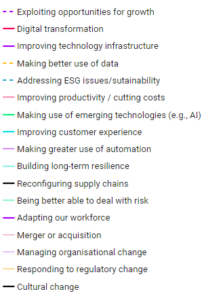How can firms stay relevant in a growth-focused market?
Despite an unpredictable business backdrop, clients have now signalled that they’re ready to target growth. And while they will be reaching out for support from consultants, they won’t be buying services that are specifically about increasing revenue. We look at where clients will be investing and how firms can position themselves to be their provider of choice.
Each quarter we ask a global sample of 200 senior executives to tell us their priorities for their businesses. Despite clients referencing falling levels of confidence about the macroeconomic picture, this quarter, exploiting opportunities for growth has shot up from near the bottom of their rankings to the top. Productivity & cost-cutting and managing organisational change, which were their top priorities earlier in the year, have fallen down the table, indicating that—having removed all the costs they can—business leaders may now be lessening their focus on the internal workings of their organisations and starting to look outwards for opportunities.
What would you say are the organisation’s three most important strategic priorities at the moment?


Quarterly Client Survey 2024 | Q3&4 S24
The good news for firms is that clients plan to use third-party support to help them meet their goals. In fact, 90% of clients expect to increase their use of consulting and professional services over the next two years, with the size of projects increasing too. However, the more confusing message is that they won’t be looking for support that’s directly about increasing revenue, with only 18% of clients selecting this as one of the areas where they are most likely to be reaching out to consultants.
This isn’t quite as counterintuitive as it may seem, because growth is one of those areas (like supply chain and HR, people & change) where executives often tell us they plan to do the work themselves. When it comes to understanding the markets they operate in, the competitors they face, and what drives revenue in their own businesses, they believe they are the experts and they’d rather invest in specialist knowledge where they need it more.
So, with clients’ needs in mind, which services should firms be focusing on to stay relevant to growth-oriented businesses?
Strategy work: After a crisis or a downturn in the market, strategy work is often the first service to recover. When under pressure, businesses batten down the hatches—focusing on cost cutting and resilience—before finally gaining the confidence to start planning for the future and for growth. At that point, consulting firms, with their cross-sector insight and reputation for strategy expertise, are sought out. We are already seeing interest in strategy work increasing in some markets, such as the GCC. However, other markets, such as the US, haven’t yet signalled this change. That’s currently pulling down the ranking of business strategy work in our data, but we’ll be watching closely to see if demand for this work ticks up in the next quarter, perhaps once the hiatus of the election has passed.
Focusing on the front office: It is clear that a business targeting growth will be doubling down on the revenue generating parts of its business model: sales, marketing, customer segmentation & analysis, customer service, and other customer-facing areas. For some consulting firms, this isn’t where their major strengths lie: They are more able to help back-office functions tackle their productivity issues, supply chain challenges, and cybersecurity needs. If the pivot to growth proves to be sustained, firms will need to look at their capabilities here and make sure they have the experts and track record to win this work.
Technology work: When it comes to expertise, clients are still looking to firms for everything technology. A strong message from clients throughout 2024 has been their need for support around delivery (they’ve moved on from planning to getting things done), and this is coming through loud and clear again in our Q4 data, with technology implementation sitting at the top of the list of areas where growth-minded clients will be looking for support. And technology work will unquestionably provide the foundation for many of the growth initiatives that clients have in mind in other ways too, whether they need to get robust data & analytics capabilities in place to better support their decision making or simply make sure they have a well-informed technology strategy guiding their way.
Confirmation of the role that clients see technology playing in driving revenue is provided by our latest Emerging Trends report, which takes an in-depth look at digital transformation: Of 150 clients surveyed who had recently undergone digital transformation projects, 31% said the aim of the project was to grow the business—the third most-selected objective.
Individual projects: Another big message coming out of our research this year is that firms must listen more carefully to what their clients are asking for. Fifty-three percent of clients told us that firms frequently fail to understand their needs, and the top reason for this was that they are too busy trying to sell them something (AKA talking not listening). Firms must listen and listen hard for early signs of emerging demand for certain types of work. For example, a resurgence of mergers and acquisitions work has been predicted for some time but hasn’t yet materialised. However, with interest rates falling and a year of uncertainty over global elections drawing to a close, it may be just around the corner if more businesses start to think about inorganic growth. Customer experience work will be worth listening out for too. Although it sits firmly midtable in our Q4 forecast of consulting demand, it is often a service that accelerates as businesses start to target growth.
Multidisciplinary work: While 90% of clients expect to increase their use of consulting over the next two years, there are no individual service areas where that magnitude of enthusiasm is being seen. To the contrary, the top area where clients in Q4 think they’ll be using more consulting services over the next 18 months is technology implementation; and while 29% of clients expect to seek more help here, the figure in Q1 was a much more impressive 68%. Similarly, the second most in-demand area is data and analytics, with 26% of clients selecting this in Q4, but 54% selecting this option in Q1.
In other words, clients say they will be looking for more consulting support, but they are less certain about what form this will take. This speaks to the big trend we see towards multidisciplinary projects; while clients won’t go out looking to buy something called “multidisciplinary work”, what they are increasingly buying are large, cross-functional, cross-discipline projects that pull in experts from across a firm. For example, clients who say they need help migrating to the cloud may be talking about a project that will need expertise in areas as diverse as technology implementation, risk management, people, HR & change, and sustainability. While projects start small, they often expand, and while the work may at first look like a pure technology project, hidden beneath the surface may be a plethora of consulting services. Projects that target revenue growth are likely to be this type of multidisciplinary work—which tackle the challenge from many different angles. Firms that can demonstrate expertise in projects that reach across silos and draw on multiple areas of expertise will appear most relevant to their clients in this space.
As we draw towards the end of 2024, we appear to have reached an inflection point. Clients have accepted that macroeconomic uncertainty is set to continue and have decided that they have spent enough time cutting costs and planning. Whether they have determined that the time is right for growth or have just given up waiting, they will be looking for support from consulting firms in a number of foundation-building, multidisciplinary ways. Successful firms will be talking about opportunities in the market and listening carefully to what individual clients say they need.
If you would like more information about any of the data in this article or would like to access more information on what clients are asking for in today’s market, then get in touch. Source can help bring your client’s unfiltered voice to the fore, with the help of in-depth surveys and perceptive client conversations, which you can then use to help reshape your propositions, services, and how you go to market.
Emma Carroll, Head of Content, Source